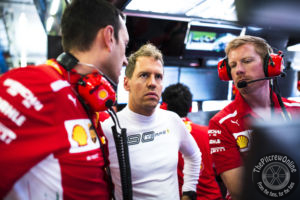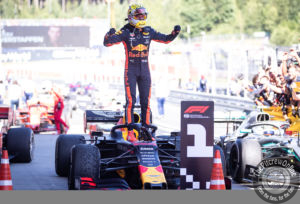Making tough judicial decisions is never easy on a Judge. You will always have on aggrieved party who disagrees with you, will take you on appeal and have their group of family and friends dislike you too. The same can be said for F1 stewards recently.
While the law, certainly here in South Africa, have a defined group of Judges for a period, F1 stewards change from race to race.
The Canadian Grand Prix and the incident between reigning and 5 time World Champion Lewis Hamilton and 4 time Champion Sebastian Vettel brought the role of the stewards into sharp focus with numerous and current drivers bemoaning the lack of consistency in decision-making and the impact it has on the ability of racers to do what they – and we – love most, race.

Source: Ferrari Media
Stewards were hauled over the coals on social media by fans who felt that the decision to award Vettel a 5-second time penalty was incorrect and cost him what was a needed win. However, the same stewards were praised for being courageous in applying the rules by fans who felt that they got it right. It is almost a no-win situation for the decision makers.
Having a permanent panel of stewards for the season may aid consistency, but it is not inconceivable that this may present a different set of problems. For one it is a massive ask of any person to do, following the paddock around all season. This is especially important when you consider that former drivers often make up the panel. The second problem deals with the members of the panel. If we are honest, given the backlash on social media, it is possible that permanent stewards could be accused of bias (based on their previous stints in F1/comments they may have made in media) if a decision does not go the way of a particular team/driver.
Yes, this is a hypothesis, but if the events of Canada and the penalty given to Daniel Riccardo after the French Grand Prix are anything to go by, the decisions of the stewards will always be called into question.
And let us not forget the pass seen around the world at the Austrian Grand Prix. ICYMI – the clash between race winner Max Verstappen and pole sitter Charles Leclerc was investigated with no penalty being handed out. Racing won according to many fans while many a Ferrari fan felt aggrieved for the 2nd time in 3 races. Essentially it was the same rule that saw Vettel receive a penalty, however this was a different incident. A wait of 3 hours saw this one decided, whereas Vettel’s was done while the race was in progress.

Photographer Credit: Getty Images / Red Bull Content Pool
On the face of it and in the mind of the F1 circle, there appears to be inconsistency in these decisions. Perhaps the problem does not lay with the decision makers, but rather on what informs the decisions?
Stick to the facts
The rule book. The FIA rule book is the veritable guide to the do’s and don’ts of F1. Among the rules is that a driver is prohibited from any manoeuvre liable to hinder other drivers or driving the car in an erratic manner, among other restrictions. Herein lies the problem – the rule book does not offer any explanatory notes on what would be considered erratic or just normal racing.
In law we have a Commentary to a legislation, which provides for an explanation of the regulations and rules. It provides clarity on the nuanced areas of law that may not appear fully in the hard and fast rule. Perhaps F1 could use something similar to assist the stewards in making decisions that take into account the practicalities of racing? In the event that this seems too cumbersome a task the solution could then lay in amending the rules to allow for the stewards to account for the practical elements of racing and take into account aspects such as what is “hard racing” vs “dangerous racing”.
Certain tracks allow for drivers to give each other a little more room, but some such as Baku, Canada and Monaco do not, which makes it difficult for the stewards to apply a general rule regarding driving in an erratic manner. An amendment to allow discretion based on these practical elements could go a long way in fixing the problem in F1 right now. – Rhea Morar (Deputy F1 Editor)
Leave a Reply